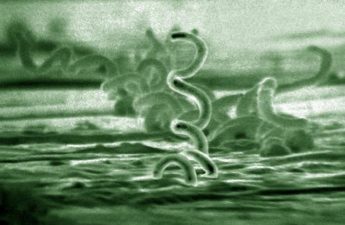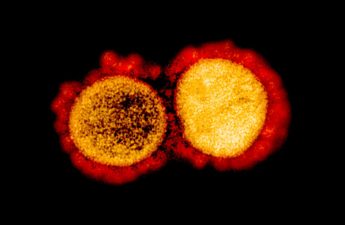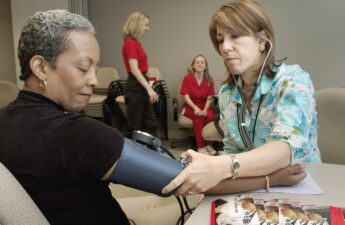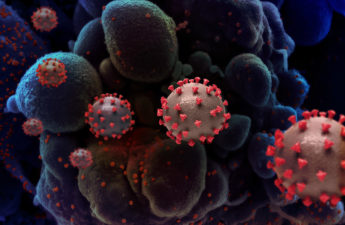new study showed patients who receive the medicine at pharmacies rather than at doctor’s offices stayed in treatment longer.
The fungus zombies in ‘The Last of Us’ are fictional, but real fungi can infect people, and they’re becoming more resistant
Many of the people watching The Last of Us are likely there for the zombies. I love the zombies too, but I’m really there for the fungus.
What is Tourette syndrome, the condition Lewis Capaldi lives with?
You might have seen the news fans of singer Lewis Capaldi helped him finish a song at a concert this week, after symptoms of his Tourette syndrome suddenly flared up and temporarily prevented him from performing. — So, what is Tourette syndrome and how is it managed?
Science Falls Behind as Syphilis Stages Another Comeback
Despite being one of the oldest known sexually transmitted infections, with possible origins in the 14th century — as well as intense public health initiatives over the past many decades — syphilis receives little attention from researchers.
Mental Health Care Must Promote Wellness, Not Just Treat Illness
The nation’s mental health care system is currently focused almost exclusively on preventing and treating mental illness — conditions like depression, anxiety, and personality disorder that adversely affect a person’s mood and behavior. Although these are critical factors in mental health, so too are the components of life that are associated with feeling good, finding happiness and meaning, connecting with others, and feeling engaged — qualities that can be collectively described as positive mental health, or mental wellness.
Texas Town Tries a New Model for Saving Rural Health Care
The revamped facilities will transfer people who need inpatient care to full-service hospitals nearby. But for many rural communities, such conversions to fewer services will be a bitter pill to swallow.
Act fast if you feel you have COVID symptoms, Medicare urges
Feeling sick? If you have any COVID-19 symptoms, act fast!COVID-19 antiviral treatments can help reduce your symptoms and keep you out of the hospital, but you must take them as soon as possible.
We can learn a lot about long COVID from years of diagnosing and treating chronic fatigue syndrome
While some long COVID symptoms are unique (microclots, lung scar tissue, or organ damage due to acute infection), most resemble the clinically very similar disorder myalgic encephalomyelitis, more commonly known as chronic fatigue syndrome.
Three in five long COVID patients have organ damage a year after infection
From this first set of scans, we found 331 participants (62%) had organ damage. Impairment of the liver, pancreas, heart and kidneys were most common (affecting 29%, 20%, 19% and 15% of participants respectively). These 331 participants were followed up six months later with a further MRI scan.
We found that three in five of the original study participants (59%) had impairment in at least one organ a year after infection, while just over one in four (27%) had impairment in two or more organs. So, for the vast majority of participants who had organ damage at six months, it was sustained until at least 12 months.
While in some cases participants with organ damage were no longer experiencing symptoms, organ impairment was associated with a higher likelihood of persistent symptoms and reduced function at 12 months.
Epigenetic and social factors both predict aging and health – but new research suggests one might be stronger
For years, researchers have been using clinical factors normally collected at physicals, like hypertension, cholesterol and weight, as indicators to predict aging. The idea was that these measures could determine whether someone is a fast or slow ager at any point in their life cycle. But more recently, researchers have theorized that there are other biological markers that reflect aging at the molecular and cellular level. This includes modifications to a person’s genetic material itself, or epigenetics.
We got some key things wrong about long COVID. Here are 5 things we’ve learnt
It can take months to recover lung function – and some people never do. COVID can increase the risk .of or worsen chronic diseases. Long COVID isn’t a single disorder. COVID shouldn’t be dismissed as a psychological problem
What’s the ‘weight set point’, and why does it make it so hard to keep weight off?
There’s a scientific reason many people return to their previous weight after dieting, and understanding the science – known as the weight set point theory – is key to achieving long-term weight loss.
Turning 50? Here are 4 things you can do to improve your health and well-being
There are four things in particular that take on greater importance when you turn 50 – that go beyond general health advice that’s beneficial at any age, like staying active, eating well and getting enough sleep.
Many Americans wrongly assume they understand what normal blood pressure is – and that false confidence can be deadly
Nearly half of Americans ages 20 years and up – or more than 122 million people – have high blood pressure. And even if your numbers are normal right now, they are likely to increase as you age; more than three-quarters of Americans age 65 and older have high blood pressure.
Black and Hispanic Americans found to experience more long Covid symptoms
Black and Hispanic Americans appear to experience more symptoms and health problems related to long COVI , a lay term that captures an array of symptoms and health problems, than white people, but are not as likely to be diagnosed with the condition, according to new research funded by the National Institutes of Health.














